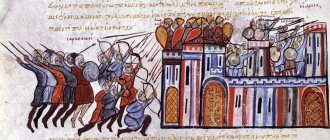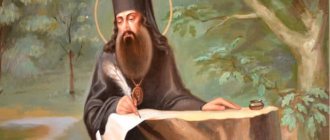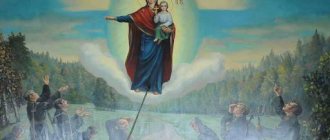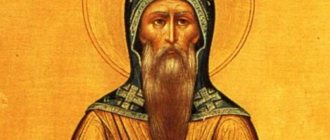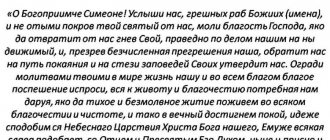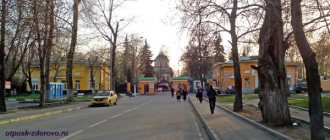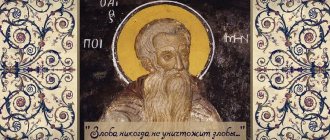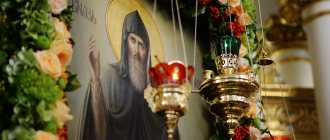"Save me, God!".
Thank you for visiting our website, before you start studying the information, please subscribe to our Orthodox community on Instagram, Lord, Save and Preserve † - https://www.instagram.com/spasi.gospodi/. The community has more than 60,000 subscribers. There are many of us like-minded people and we are growing quickly, we post prayers, sayings of saints, prayer requests, and timely post useful information about holidays and Orthodox events... Subscribe. Guardian Angel to you!
On the day of veneration of Saint Ephraim of Novotorzh, many Christians gather at his icon to offer prayers for help. What kind of saint this is and what it is customary to offer petitions to him for - you will find out in this article.
Life of Ephraim of Novotorzhsky
The monk was born in Hungary. Together with his brothers, he left his hometown. This happened due to the fact that Christians were persecuted at that time. The brothers came to Rus' and began to serve the Prince of Rostov. A few years later, the prince and brother die. Their heads are cut off.
The criminals cut off the head to remove the gold pendant on the neck. Efrem was in Rostov at that time, having learned about the murder of his brother, he came to the crime scene. He took his brother's head with him. Having experienced a difficult moment in life and the loss of a loved one, Efrem Novotorzhsky decides to lead a hermit’s life.
The best article for you, go to: Saint Barsanuphius the Great
Over time, other monks began to join the saint nearby, after which it was decided to build a monastery. It was dedicated in honor of his brothers. Novotorzhsky died in old age. He was buried in the monastery, and his brother’s head was placed in the grave. This is what the monk himself bequeathed.
The relics are to this day in the Cathedral of the Creative Saints. Remembrance Day is considered January 28 and June 11. It is on those days that prayer to the monk is considered the most powerful.
Quotes from the Holy Fathers for every day
June 24 - the memory of the Monk Ephraim of Novotorzh, one of the three Hungarian brothers who served with the holy Prince Boris, after whose martyrdom Ephraim retired from the world and became the founder of the Boris and Gleb Monastery in the city of Torzhok.
viagra gegenanzeigenviagra kaufen
argaiv1076
At the end of the first millennium, when the Hungarians settled the lands of Pannonia, they found themselves in the neighborhood of Slavic peoples who had already converted to Christianity. At the same time, some Hungarians, under the influence of Byzantine and Slavic missions, also received baptism. Thus, at the end of the tenth century, Duke Geza (father of the holy King Stephen) was baptized according to the Greek rite, thanks to the influence of his wife, who had been converted by a Byzantine missionary. It is noteworthy that even the Hungarian word kereszt (“cross”) is of Slavic origin, and from this word comes the name of Christians in Hungarian - keresztények.
In 988, through the efforts of Saint Prince Vladimir, the baptism of Rus' took place. After 12 years, his neighbor, King Stephen, brings the Hungarians to Christ. “Peace and love” are established for a long time between the newly baptized rulers and peoples, according to the ancient Russian historical treatise “The Tale of Bygone Years.”
The Hungarians were fearless and skilled warriors, so it is not surprising that Constantinople often asked for their help; traces of their presence are found everywhere where the Byzantine emperor defended his rights by military means.
The three leading powers of central Europe at the turn of the first two millennia - Byzantium, Rus' and Hungary often acted on the same front against common enemies. Therefore, the service of Hungarians in the army of the Russian prince was a common thing and, most likely, it was as professional selected warriors that the three Hungarian brothers George, Moses and Ephraim ended up in the Russian squad, who later became saints of the Russian Orthodox Church.
Approximately the same hypothesis about the reason for the appearance of three brothers in Rus', who were later destined to become Russian saints, is held by the famous scientist from Szeged, Professor Valery Lepakhin:
“They mention predominantly religious reasons for the resettlement of three brothers to Rus'. But one cannot ignore the simplest assumption. The Grand Duke of Kyiv Vladimir, according to sources, had good political relations with King Stephen, and the Hungarians at that time were considered in Rus' the best specialists in the field of horse breeding for military purposes. As is known from the chronicles, Grand Duke Svyatoslav in 969 wanted to move his capital to the Danube; One of the reasons for the resettlement he called the proximity of Hungary, from which horses come, well trained for military purposes. In the mentioned life of Gellert it is said that Ayton had “countless numbers of hot horses, not counting those that were guarded by his shepherds in the stalls.” These data force us to leave this possibility in sight: the eldest of the brothers Ephraim was simply invited to serve by Grand Duke Vladimir or Prince Boris as a specialist in horse breeding.”
Basic information about the Hungarian brothers has been preserved for us by the Life of Ephraim of Novotorzhsky, who was the last of the three brothers to pass away and became the founder of the Boris and Gleb Monastery.
The brothers were born in the second half of the 10th century and at the end of the same century arrived in Rus', where they entered the service of the beloved son of Grand Duke Vladimir Boris. At the same time, George became the prince’s youth, and Ephraim became the stable boy. What Moses was doing at that time, the sources are silent.
We can safely assume that these brave and passionate young men were among the best warriors of their time, otherwise they would not have become the bodyguards of Prince Boris, the beloved son of Grand Duke Vladimir. But here it should immediately be noted that in addition to military valor, the Russian Prince Boris valued his Hungarian comrades for their personal Christian piety, in which he himself was raised from childhood. This quality led to the fact that soon all of them, each in their own way, discovered the history of Russian holiness.
___
Let us recall the historical outline of the epic events of the death and glory of the first Russian saints Boris and Gleb. They, like the sons of Grand Duke Vladimir (baptized Roman and David), receive a Christian upbringing, are distinguished by sincere faith and personal piety, they are loved by the people and the army.
The year 1015 comes. The Grand Duke sends his son Boris, who reigned in Rostov, to repel the Pecheneg raid. Boris and his squad go out to meet the enemy, but there is no battle, the enemy runs in fear as soon as he sees the Russian shields. And on those same days, Grand Duke Vladimir dies in Kyiv. The people expect that the pious Prince Boris will take the reins of government into his own hands. But in Kyiv, the eldest in age, but who did not enjoy the trust of the people and the late Prince Vladimir, his illegitimate son Svyatopolk, sits at the princely table.
Boris's squad, from which the enemies flee at the mere sight of it, is outraged by Svyatopolk's act and asks Boris to go to Kyiv and take the grand-ducal power that rightfully belongs to him. And here the amazing highest spiritual qualities of Prince Boris are manifested. He does not want to start civil strife between the brothers and voluntarily cedes the princely table to Svyatopolk. He sends the army home and continues on its way alone, accompanied only by faithful servants and bodyguards, the first among whom is the Hungarian George.
But Svyatopolk does not believe the noble choice of Prince Boris and decides to physically eliminate all competitors for the grand ducal table. Princes Boris and Gleb especially worry him, as are the sons of Prince Vladimir, born in a legal marriage with the Byzantine princess Anna.
The chronicle preserved the words of warning conveyed to Boris about Svyatopolk’s evil intent: “to beat all the heirs of his father, to accept all his power alone.”
And Boris’s courageous answer: “I will not raise my hand against my brother!”
At a halt near the Alta River, Prince Boris is overtaken by a squad of assassins sent by Svyatopolk. The chronicle conveys many details of that tragic night. When the villains surrounded the prince's tent, Boris and his beloved servant George were praying in it.
The killers waited until the end of the evening prayer and burst into the tent. In such decisive seconds, the true essence of a person is revealed, his courage or cowardice. George’s only impulse was not the desire to save his life, but the desire to protect Prince Boris, his master and brother in Christ. In this impulse, the highest spiritual qualities and military valor of a Christian Hungarian merged together.
The first spears pierced George's body, then Prince Boris received mortal wounds. The killers took the body of the prince to their customer, Svyatopolk, and left the bodies of George and other soldiers lying at the crime scene. George was wearing a princely golden hryvnia, a sign of the prince’s highest trust, which was sealed and could not be removed from his head. In order to take possession of the precious sign, the killers cut off the head of the brave young man and took the hryvnia with them.
After the bloody massacre on the Alta River with Prince Boris and his entourage, the same fate befell his younger brother, Prince Gleb, who also preferred to accept death rather than start an internecine war. Their other brother Svyatoslav tried to escape and wanted to find refuge in Hungary, but in the Carpathian mountains he was overtaken by killers sent by Svyatopolk.
For all his atrocities, Svyatopolk received the name Damned in popular memory, forever becoming one of the most negative characters in Russian history. Soon he was expelled in disgrace from Kyiv by the squad of Prince Yaroslav the Wise, the only survivor of the sons of Grand Duke Vladimir, which quenched the people's thirst for higher truth and justice.
And the brothers Boris and Gleb, who died, became the first saints canonized by the Russian Church. Together with them, the Hungarian warrior George, who was killed along with the holy Prince Boris on the Alta River on July 24, 1015, received universal popular veneration and love.
George's older brothers apparently were part of the army that Prince Boris released. When news of the massacre on Alta reached them, they came to the scene of their brother's death and found his decapitated body and head.
We must try to put ourselves in their place, to imagine what a storm of feelings they experienced over the body of their beloved brother. And here we are again faced with an unexpected turn, a decision incomprehensible to the average person, especially if we take into account the character and customs of that time. It is not revenge, but faith that prevails in the broken hearts of the brothers.
Hatred is not for the murderers, who were only a tool in the wrong hands, and not even for Svyatopolk. And hatred for the father of all murderers and all evil, for Satan, is what possessed them until the end of their earthly lives. They did not give chase, did not go to Prince Yaroslav, who was gathering a squad to restore justice on Russian soil, but went out to battle with the main killer of their brother, Satan - the source of all evil in the world. Truly a great and courageous step! And the most important thing is that this was not a fleeting exaltation, a momentary decision. The entire subsequent life of Moses and Ephraim testifies that this choice in the lifeless body of the younger brother was firm, conscious and unyielding.
The battle that these two best warriors fought was harder and more dangerous than all the bloody battles in which they participated. And the enemy was invisible, and the weapon was unusual for them at first: “the shield of faith, the helmet of salvation, and the sword of the Spirit, which is the Word of God” (Eph. 6:17). But they were ready for any test, and emerged victorious from this invisible battle, as their subsequent fate showed.
Having said goodbye to his brother, Moses headed to Kyiv, but when the Polish king Boleslav captured the city in 1018, he, along with other Russian soldiers, ended up in Poland as a prisoner. Probably, he really was one of the best warriors of his time and stood out from those around him with his strength and determination. In addition, apparently, he was well-built and handsome, because, even while in captivity, he attracted the attention of one rich and noble widow, who was inflamed with passion for him and wanted to make him her husband.
Despite the refusal of Moses, who had only one desire, to leave the world and become a monk, the woman ransomed him from captivity and tried to seduce the warrior with power and wealth, feasts and caresses. But Moses resolutely rejected all offers, answering that he would not exchange spiritual riches for the corruptible things of this world and would be a monk.
By the providence of God, one Athonite hieromonk who found himself in those places tonsured Saint Moses into monasticism, after which the woman, enraged by the final refusal, ordered Saint Moses to be stretched out on the ground and beaten with sticks so that the ground was saturated with blood.
Soon the Lord rewarded everyone according to their merits even in this earthly life. The Polish king Boleslaw suffered a sudden death in 1025. Troubles began in the country, in which this noble widow also died, and Moses, having healed his wounds, returned to Rus' in 1031 along with other captives, thanks to the efforts of Yaroslav the Wise.
In the same year, Moses reached the monastery and found himself under the leadership of the founder of Russian monastic life, St. Anthony of Kiev-Pechersk. But even among the disciples of this great Abba, Moses stood out for his strength of spirit and firmness in the fight against the invisible enemies of the Christian - temptations and enticements.
Moses labored in the Pechersk Monastery for more than ten years. Through fasting and prayer he rose from strength to strength and was granted by God many spiritual gifts, insight and miracles. He left the earthly world on July 26, 1043 and was buried in the Near Caves, where his holy relics still rest incorrupt in the cave of St. Anthony.
The eldest of three brothers, Ephraim, after the tragedy on the Alta River, went to the forests to the north and settled in a secluded place on the banks of the Tvertsa River, not far from the town of Torzhok. He took the severed head of his beloved brother with him and kept it until the end of his life.
At his own expense, Ephraim built a hospice house and began to take care of the poor and wanderers, as was customary among the pious people of Ancient Rus'.
According to legend, he practiced hospitality in memory of his missing brother Moses, who was a stranger in a foreign country. Information has been preserved that Saint Ephraim visited Kyiv several times in the hope of meeting his brother.
In 1020, the Russian Church already venerated the newly-minted holy passion-bearers Boris and Gleb, and their miraculous relics were discovered.
In 1038, Ephraim, together with his disciple Reverend Arkady of Novotorzhsky and other monks, built a temple in honor of these saints. At the temple, the Borisoglebsky Novotorzhsky monastery was formed, in which Ephraim became abbot, and remained so until old age.
In the monastery he built, the Monk Ephraim labored in fasting and prayer and zealously taught piety to the brethren.
Having taught the last instruction to his disciples to spend their lives in silence and brotherly love, not to abandon hospitality and almsgiving, especially to be diligent in fasting, prayer and singing, to keep the fear of God in their hearts and to avoid worldly vanities, the Monk Ephraim rested in old age on January 28, 1053.
Dying, he bequeathed to put the head of brother George with him in a coffin, which he himself carved, which the brethren of the monastery did.
The Lord glorified St. Ephraim with the gift of miracles. For example, several centuries later, already during the time of Ivan the Terrible, the royal servants, who were robbing the people and monasteries along the Tvertsa River, were admonished and brought to repentance by the venerable elder Ephraim who miraculously appeared to them.
On June 24 (NS) the memory of the transfer of the relics of St. Ephraim of Novotorzh is celebrated.
On this day - June 11, 1572, Novgorod Archbishop Leonid, on his way from Moscow to Novgorod, visited the Boris and Gleb Monastery. He asked the abbot and the brethren where the relics of the miracle worker were placed. When they showed the saint’s tomb, the archbishop ordered the coffin itself to be opened. Then those present saw the saint’s body incorrupt and felt a fragrance. After this, in the 80s of the 16th century, a local celebration of St. Ephraim was established. Currently, the memory of the saint of God is revered throughout the church.
A description of the reliquary with the relics of St. Ephraim in the Boris and Gleb Cathedral, made at the beginning of the twentieth century, has been preserved, according to which it also contained the venerable head of St. George Ugrin, covered with black velvet, with an image in enamel of the head of the martyr and with an inscription around it made of small pearls: “ The head of the martyr George, the Novotorzhsky wonderworker."
To the deep sorrow of believers, on February 5, 1919, the tomb of St. Ephraim was opened at the direction of the new godless government, and after the liquidation of the Novotorzhsky Monastery in 1931, the relics of St. Ephraim and the head of St. George Ugrin were removed from the cathedral, their further fate is unknown.
On the icon of the saint, on the scroll that St. Ephraim holds in his hand, the text is usually written: “Having left your Bolyar rank and home, erected a temple in the name of your sovereigns, Saints Boris and Gleb, and having gathered a multitude of monks, established a monastery, content with fasting and having labored in prayers.”
In 2015, in Torzhok, not far from the Boris and Gleb Monastery, a monument to St. Ephraim, the patron saint of the city, was erected.
Troparion to St. Ephraim of Novotorzh, tone 1
Having been enlightened by divine grace from above, reverend, with much patience in temporary life you accomplished the feat. In the same way, you exude miracles of grace to all who come with faith to the race of your relics, most blessed Ephraim, for this reason we call: glory to Him who gave you strength, glory to Him who crowned you, glory to Him who works healing through you.
Kontakion to St. Ephraim of Novotorzh, tone 8
Like the revealed Russian star, today shining with miracles, you appeared, Reverend Father Ephraim. Therefore, do not stop praying for your flock, preserve your fatherland, the city and the people who honor you with faith and diligently flow to your honest relics, and let us cry out to you with great voice: Rejoice, God-wise Ephraim, our father.
Based on materials:
https://www.stefmon.ru
https://onkim.orthodoxia.org
What do they pray to the monk for?
Today, the icon with the face of the saint can be found in almost every Orthodox church. Thousands of Orthodox believers come to his image to pray and ask for the following:
- protection from magical powers;
- protection from evil and negativity coming from people;
- protecting your home from unforeseen situations and natural elements;
- strengthening the family and spouses understanding each other;
- health of the whole family.
Prayer petitions to St. Ephraim can be read in the same way as to other Orthodox saints with prayer from the prayer book. It can be purchased at any icon shop. If for some reason it is not possible to use special words, then you can pronounce petitions in your own words. It is very important to form simple and understandable thoughts.
The best article for you, go to: Icon of the Mother of God Quick to Hear: what it helps with and its significance for the Orthodox
The petition is read either at home in front of the icon of the saint or within the walls of the temple. It is important that no one distracts you while reading it. After help is sent, you must read a prayer of thanks, which can also be found in the prayer book.
It should be noted that the monk played such a huge role in the history of the Orthodox faith that in 2015 a monument to Ephraim of Novotorzh was unveiled in Torzhok. It has become a real magnet for tourists who visit this city. The saint is now the guardian angel of the city. Locals say that since the monument was erected, life in the city has become much calmer and more comfortable.
O sacred head, great and wonderful miracle worker, Our Father Ephraim! To you, a quick helper and a zealous prayer book for us, we humbly resort and prayerfully ask you: do not forsake us, sorrowful and burdened with many sins, with your holy help and gracious intercession. Do not forget us, your children, most sacred father, but remember us ever in your heavenly, God-pleasing prayers at the throne of the Most Holy Trinity, where you stand with the Angels and all the saints, and see all our needs and troubles, as if we are overwhelmed by passions and do not have boldness towards the Creator, ask Him for mercy and salvation. In the same way, we offer you, as a propitiator before the Lord, and through you we hope to receive the mercy of God and the forgiveness of our sins from the Almighty and inherit eternal salvation, so we glorify and sing the greatness and grace and love for mankind of the Father and the Son and the Holy Spirit, and your fatherly intercession, now and ever and forever and ever. Amen.
God bless you!
The best article for you, go to: What do they pray to Hypatius of Gangra for?
You will also be interested in watching a video story about the saint:
